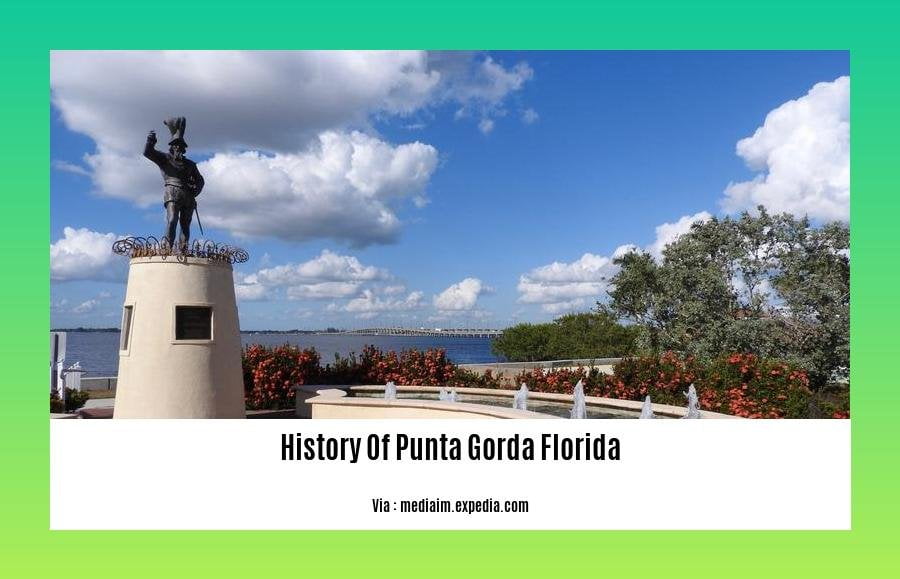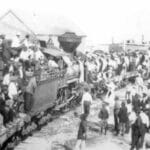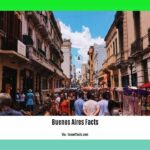Embark on a fascinating journey through time as we delve into the rich history of Punta Gorda, Florida, a city steeped in a tapestry of captivating stories and remarkable transformations. From its humble beginnings as a fishing village to its emergence as a vibrant cultural hub, Punta Gorda’s journey is a testament to the indomitable spirit of its people. Join us as we uncover the hidden treasures of the past, exploring the pivotal moments, influential figures, and architectural marvels that have shaped this extraordinary city into the gem it is today. [- A Journey Through Time: Unveiling the History of Punta Gorda, Florida]
Key Takeaways:
Punta Gorda’s founding in 1884 by surveyor Kelly Harvey can be attributed to Isaac Trabue’s instructions.
The city’s name, translating to “Fat Point,” originates from a land point jutting into Charlotte Harbor.
The Calusa people were the region’s original inhabitants before the arrival of European settlers.
Situated on the southern bank of the Peace River and the eastern shore of Charlotte Harbor, Punta Gorda boasts a unique geographical location.
Several historic districts and landmarks, including ten sites listed on the National Register of Historic Places, grace the city’s landscape.
Punta Gorda’s rich history dates back to the late 1800s, when white settlers began to establish their presence in the area.
History of Punta Gorda, Florida
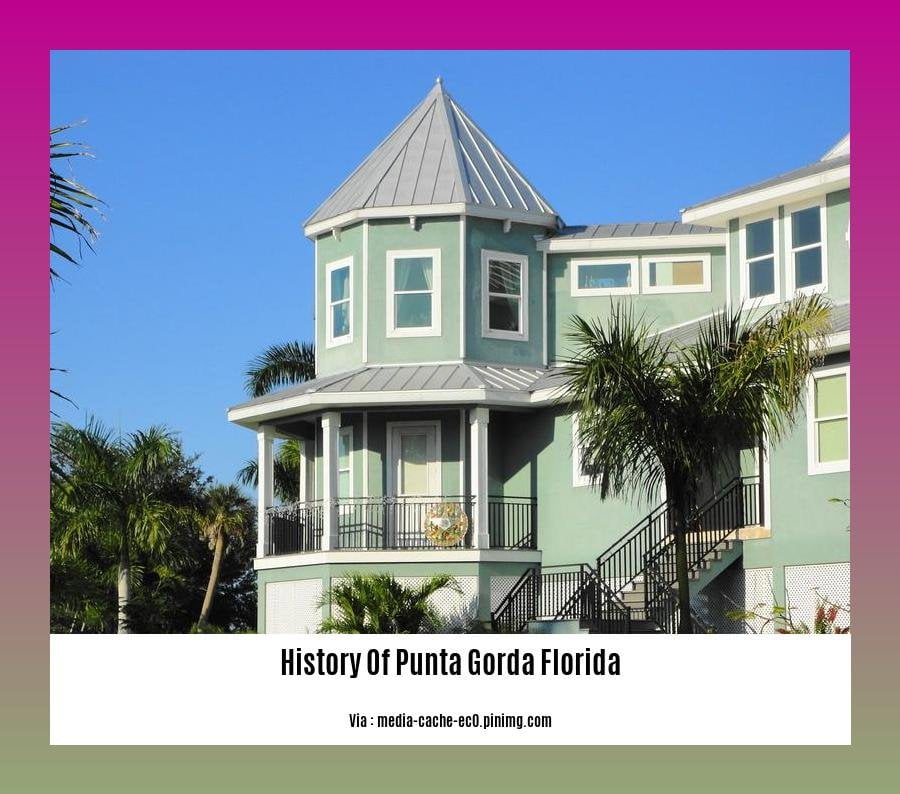
Punta Gorda, a vibrant city nestled on the southern bank of the Peace River and the eastern shore of Charlotte Harbor, boasts a rich history that dates back to the late 1800s. Embark on a captivating journey through time as we uncover the fascinating history of Punta Gorda, Florida.
The Indigenous Roots
Before the arrival of European settlers, the region was home to the Calusa people, skilled fishermen and traders who thrived in the area’s abundant natural resources. The Calusa left an indelible mark on the land, their legacy woven into the fabric of Punta Gorda’s cultural heritage.
Punta Gorda’s Founding
In 1884, surveyor Kelly Harvey, acting on the instructions of Isaac Trabue, a visionary entrepreneur, laid the foundation for what would become Punta Gorda. The name, translating to “Fat Point,” aptly describes the land’s projection into Charlotte Harbor.
The Railroad’s Influence
The arrival of the railroad in 1886 marked a pivotal moment in Punta Gorda’s history. This vital transportation link transformed the city into a bustling hub for agriculture and commerce, attracting settlers from across the country.
The Great Fire of 1924
In 1924, a devastating fire swept through Punta Gorda, razing entire blocks of the city. This tragedy, while a setback, ignited a spirit of resilience and renewal among the residents.
The Rise of Tourism
With its picturesque waterfront, subtropical climate, and historic charm, Punta Gorda emerged as a popular tourist destination in the 20th century. Visitors flocked to the city to enjoy its natural beauty, recreational activities, and rich cultural heritage.
Preserving the Past
Today, Punta Gorda takes pride in preserving its rich history. The city boasts several historic districts and landmarks, including ten sites listed on the National Register of Historic Places. These treasured landmarks stand as a testament to the city’s remarkable journey through time.
Embracing the Future
As Punta Gorda looks to the future, it remains committed to honoring its past while embracing progress and innovation. The city continues to attract new residents and businesses, drawn to its unique blend of history, culture, and natural beauty.
Punta Gorda’s storied history is a testament to the enduring spirit of its people. From its humble beginnings as a small settlement to its rise as a thriving city, Punta Gorda has weathered storms, celebrated triumphs, and emerged as a vibrant and welcoming community. As the city continues to evolve, its rich history will forever be a source of pride and inspiration for its residents and visitors alike.
Ever wanted to know the history of road transport? Or how about the history of Royal Doulton? What about the history of running shoes? What are you waiting for then? Click away!
HISTORY OF PUNTA GORDA, FLORIDA
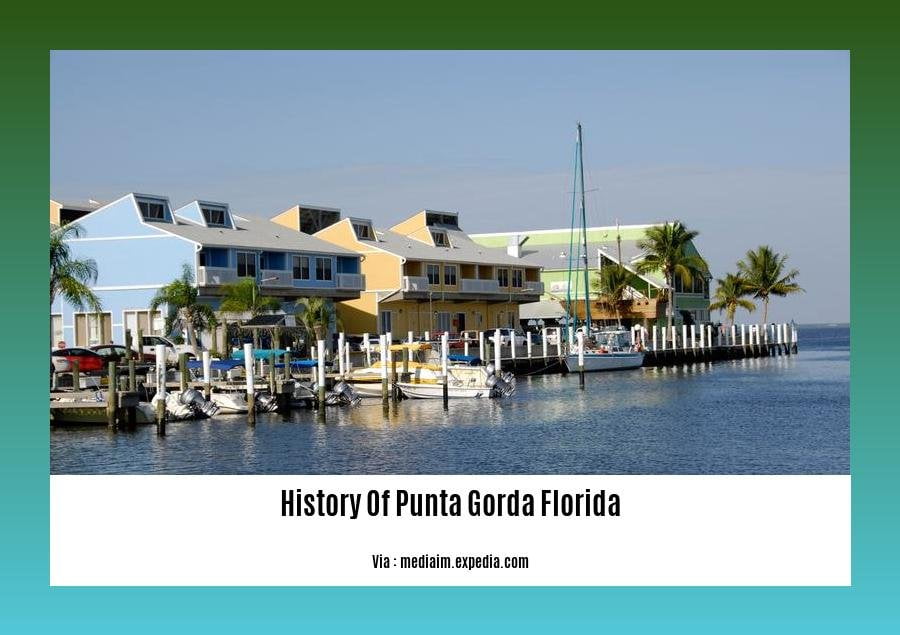
I’m here to take you on a fascinating journey through time, exploring the rich HISTORY OF PUNTA GORDA, FLORIDA!
Imagine yourself embarking on a voyage to a city where every corner whispers tales of intrigue and wonder. Welcome to Punta Gorda, a treasure trove of heritage, where the past unfolds before your very eyes.
Key Takeaways:
– Punta Gorda was established in 1884 by surveyor Kelly Harvey, following Isaac Trabue’s instructions.
– Despite the name “Punta Gorda” capturing its position on Charlotte Harbor, it does not translate to “Fat Point.”
– The Calusa tribe inhabited the land before European settlers arrived, leaving a legacy of cultural richness.
– Historic districts teeming with charm, like the Punta Gorda Historic District, beckon you to explore yesteryear’s charm.
– A proud lineage of pioneers, fishermen, and citrus growers shaped the city’s vibrant identity.
From its humble beginnings as a strategic port, nestled along the Peace River and Charlotte Harbor, to its evolution into a thriving community, Punta Gorda has experienced a remarkable transformation. Imagine walking the same streets where pioneers, fishermen, and citrus magnates once tread, leaving an indelible mark on the city’s soul.
Strolling through the Punta Gorda Historic District, with its pristine Victorian-era homes and vibrant downtown, is akin to stepping into a living museum. A diverse melting pot of cultures, ethnicities, and architectural styles blend seamlessly, capturing the essence of a bygone era.
The power of the citrus industry in Punta Gorda’s history is palpable. Groves flourished, and homes were built, shaped by the citrus boom. Punta Gorda became known as the “Gateway to the Everglades,” promising adventure and prosperity, attracting tourists and settlers alike.
Punta Gorda has painstakingly preserved its heritage. The Punta Gorda History Center, housed within a restored 1926 building, stands as a testament to the city’s unwavering commitment to safeguarding its past. The charm of yesteryear permeates the air at the Punta Gorda History Park, a replica of an 1890s village, showcasing the lifestyles of the early pioneers.
So, dear readers, let your imagination soar as you traverse the HISTORY OF PUNTA GORDA, FLORIDA. An epic saga of transformation, resilience, and community spirit awaits your discovery.
Citations:
1. City of Punta Gorda, FL:
2. Punta Gorda, Florida – Wikipedia:
History Of Punta Gorda Florida Map
Punta Gorda, a beautiful city on Florida’s Gulf Coast, boasts a rich history waiting to be explored. Let’s delve into the captivating narrative of Punta Gorda, a place where nature’s allure and human ingenuity intertwined to create a tapestry of stories worth discovering.
Key Takeaways:
Founded in 1884 by Isaac Trabue and surveyor Kelly Harvey, Punta Gorda’s growth was fueled by agriculture, fishing, and tourism.
The city’s strategic location on the Peace River and Charlotte Harbor made it a crucial transportation hub, connecting it to the world.
Punta Gorda’s architectural heritage is a testament to its diverse past, showcasing a blend of Victorian, Craftsman, and Mediterranean styles.
The city’s commitment to preserving its history is evident in its many historic sites, including the Punta Gorda Historic District and the Punta Gorda History Center.
Take a leisurely stroll down Punta Gorda’s charming downtown, where you’ll be greeted by historic buildings housing delightful shops, restaurants, and art galleries.
Punta Gorda’s Founding and Early Years
Punta Gorda owes its existence to Isaac Trabue, a visionary businessman who saw the potential in this unspoiled land. In 1884, he partnered with surveyor Kelly Harvey to plat the town, naming it Punta Gorda, Spanish for “Fat Point,” referring to the land’s projection into Charlotte Harbor.
Agriculture, Fishing, and Tourism: The Pillars of Punta Gorda’s Economy
The city’s favorable climate and rich soil made it ideal for agriculture, with citrus groves and truck farms flourishing in the surrounding countryside. Fishing was another important industry, with Punta Gorda serving as a hub for commercial and recreational fishing. The arrival of the railroad in 1904 further boosted the city’s economy, making it a popular tourist destination.
Architectural Heritage: A Tapestry of Styles
Punta Gorda’s architectural landscape reflects its diverse history, with buildings showcasing a harmonious blend of Victorian, Craftsman, and Mediterranean styles. The Victorian era left a lasting legacy, with ornate gingerbread trim, wraparound porches, and pastel-colored exteriors gracing many homes. Craftsman-style bungalows, with their low-pitched roofs, exposed rafters, and built-in cabinetry, added a touch of rustic elegance to the city’s streetscape. Mediterranean Revival architecture, with its arched doorways, stucco walls, and red tile roofs, brought a touch of Old-World charm to Punta Gorda.
Preserving the Past: Punta Gorda’s Commitment to History
Punta Gorda takes great pride in preserving its rich history. The Punta Gorda Historic District, designated in 1991, encompasses over 500 historic buildings, lovingly restored to their former glory. The Punta Gorda History Center, housed in a beautifully restored 1920s-era bank building, showcases the city’s past through interactive exhibits and historical artifacts.
Exploring Punta Gorda Today
Modern-day Punta Gorda invites visitors to immerse themselves in its historic charm while enjoying all the amenities of a vibrant city. Stroll down Fisherman’s Village, a charming waterfront complex brimming with shops, restaurants, and galleries. Embark on a guided boat tour to explore the scenic waterways and spot playful dolphins. Immerse yourself in the arts at the Punta Gorda Art Center, featuring rotating exhibits by local and regional artists.
As you wander through Punta Gorda, you’ll discover a city that has successfully preserved its rich history while embracing the modern world. Its historic buildings, charming downtown, and vibrant arts scene make it a captivating destination for history buffs, nature lovers, and anyone seeking a taste of Old Florida charm.
Citations:
- History of Punta Gorda
- Punta Gorda History Center
FAQ
Q1: What was Punta Gorda originally named?
A1: Punta Gorda was originally named Trabue, after Isaac Trabue, who orchestrated the subdivision’s surveying.
Q2: What is the significance of Punta Gorda’s location?
A2: Punta Gorda’s strategic location at the southern shores of the Peace River at its mouth on Charlotte Harbor influenced the arrangement of its streets and blocks, shaping the city’s layout.
Q3: What are some of the historic districts and landmarks in Punta Gorda?
A3: Punta Gorda has a thriving historic district with distinct neighborhoods, including ten sites listed on the National Register of Historic Places, showcasing the city’s rich heritage.
Q4: How did Punta Gorda come to be established?
A4: Punta Gorda was established in 1884 by surveyor Kelly Harvey, acting on instructions from Isaac Trabue, who played a pivotal role in the city’s founding.
Q5: What can visitors expect to learn about Punta Gorda’s history?
A5: Visitors to Punta Gorda can immerse themselves in the city’s history by exploring its historic districts, visiting landmarks, and delving into the stories of its past, gaining a deeper appreciation for its unique journey through time.
